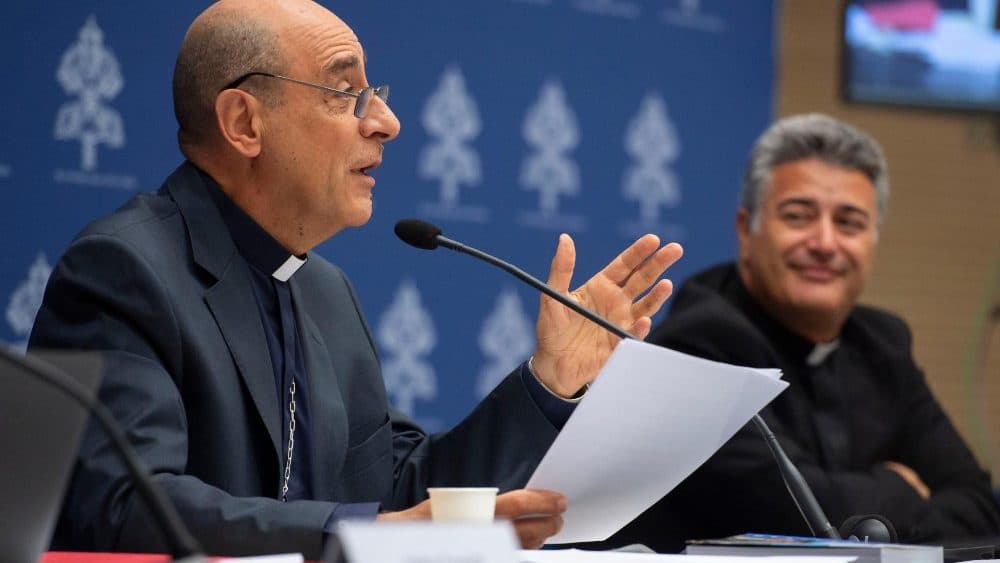ROME – Responding to criticism that he failed to show up for a discussion on Friday for members of the Synod of Bishops that was to include the question of female deacons, the Vatican’s doctrinal czar insisted Monday that Pope Francis has made it clear that now is not the time to resolve that issue, but that in the meantime other possibilities for empowering women already on the books are being under-utilized.
Argentine Cardinal Victor Manuel Fernandez said that a commission to study the possibility of women deacons created by Pope Francis in 2020, and led by Cardinal Giuseppe Petrocchi of Aquila in Italy, has reached partial conclusions which will be published shortly, but nonetheless its work “continues” and is open to “considerations, proposals and concerns.”
Fernandez’s communique, released Monday by the Vatican Press Office, came after a series of meetings on Friday, intended to give synod participants an opportunity to interact with the members of ten study groups Pope Francis established in advance of the October assembly to consider some of the most contested issues.
By far, the largest number of synod participants showed up for the session with the group dedicated to theological and canonical matters related to ministry, which is the group to which the female deacons question has been assigned. Most of those participants expected Fernandez to be present, since he was the one who presented an overview of the group’s mandate in an Oct. 2 address.
When Fernandez didn’t show up, many participants came away expressing disappointment and irritation, which was compounded by the fact that two junior officials of the dicastery appeared instead, but without authority to answer most questions.
In response to the umbrage, Fernandez noted that he’s not actually the coordinator of the group, a role which belongs instead to the doctrinal secretary of the Dicastery for the Doctrine of the Faith, Italian Father Armando Matteo. According to Fernandez, Matteo had a medical appointment Friday, which is why the other officials were dispatched.
Fernandez said when he realized that people had expected him to appear, he offered to arrange a second meeting on Thursday, Oct. 24. At that time, he said, he will also reveal the names of the individuals who make up the study group, responding to grumbling that up to now it’s the lone group whose membership has been kept secret.
On the core issue of women deacons, Fernandez said the pontiff has made it clear the issue “is not yet mature,” but insisted that Francis is “very concerned for the role of women in the church,” and has asked the dicastery for the faith to explore other possibilities that don’t involve holy orders.
Fernandez then asserted that a focus on the diaconate “does not resolve the question of millions of women in the church.” He said that there are concrete ways of empowering women that haven’t been fully exploited.
First, he pointed to the new ministry of catechist, created by Pope Francis in May 2021 and opened to women. He said that one form of that ministry would be a catechist who actually leads a faith community in the absence of a priest, a role which implies real leadership and authority, and which women can perform. Yet, Fernandez said, “very few” bishops’ conferences have acted on the possibility, saying it hasn’t “been received.”
Second, he pointed to the ministry of acolyte, opened to women by Pope Francis in January 2021.
“In fact, it’s been conceded only in a small percentage in the dioceses, and many times priests don’t want to present women to the bishop for this ministry,” he said.
Third, Fernandez noted that even the diaconate for men is underdeveloped, with many dioceses in the world not having any deacons at all, and many of those that do treating it only as a step towards priesthood. (Statistics confirm the point; according to Vatican data, 97 percent of the roughly 48,000 permanent deacons in the world, meaning men who are usually married and not preparing for the priesthood, are in North America and Europe.)
“These few examples make us understand that hurrying to request the ordination of deaconesses is not the most important response to promote women,” Fernandez said.
Defending his dicastery’s focus on ways women can exercise authority in the church without ordination, Fernandez said that “reality is superior to ideas.”
The interest, he said, is in leadership roles women have played “not because they were imposed on communities, or as the result of a study, but because [women] have acquired this authority under the impulse of the Spirit and facing a real need of the people.”
“I’m convinced that we can move forward, step by step, and arrive at every concrete things, so that we may understand that there’s nothing in the nature of a woman that prevents women from occupying very important positions for the leadership of churches,” Fernandez said.
“That which truly comes from the Holy Spirit can’t be stopped,” he said.













